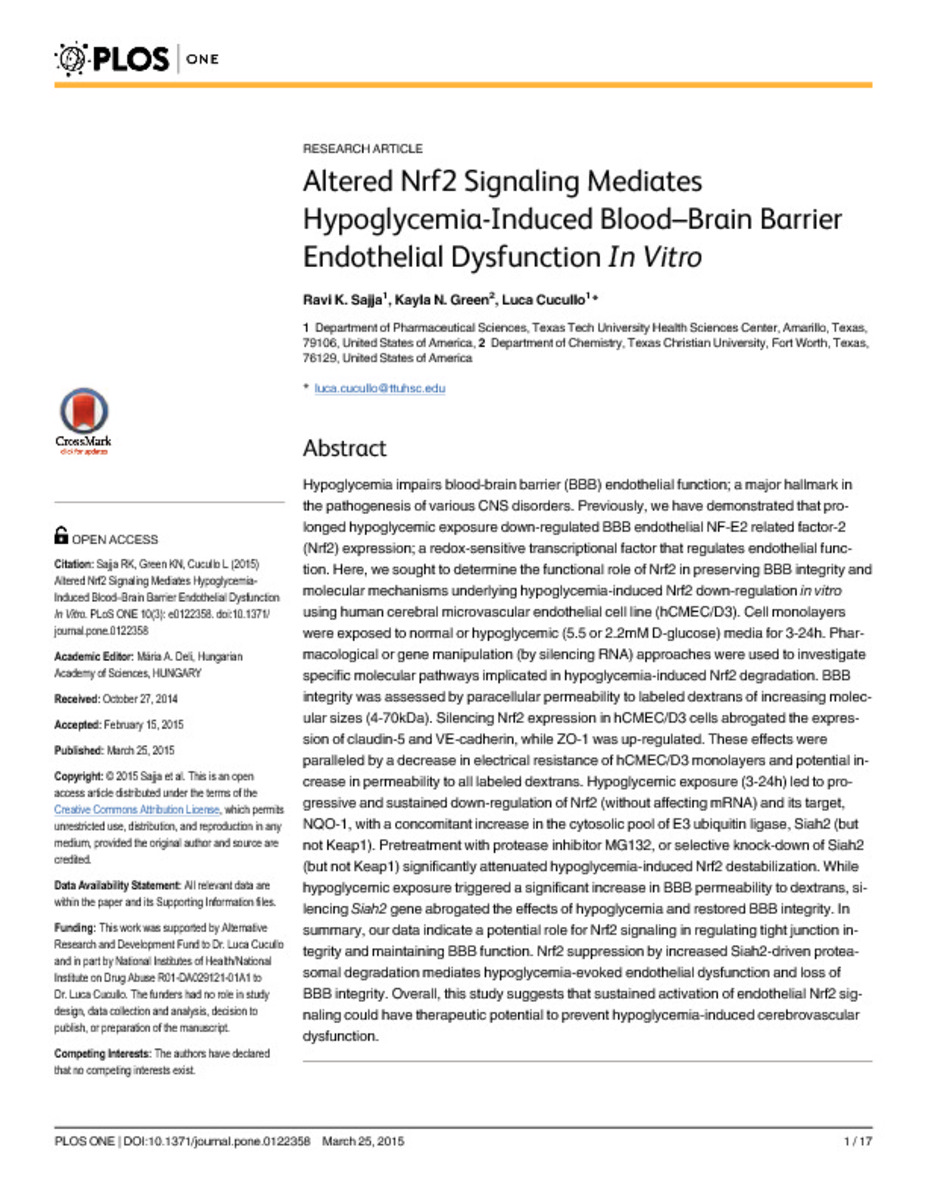Altered Nrf2 Signaling Mediates Hypoglycemia-Induced Blood-Brain Barrier Endothelial Dysfunction In VitroShow full item record
| Title | Altered Nrf2 Signaling Mediates Hypoglycemia-Induced Blood-Brain Barrier Endothelial Dysfunction In Vitro |
|---|---|
| Author | Sajja, Ravi K.; Green, Kayla N.; Cucullo, Luca |
| Date | 2015-03-25 |
| Abstract | Hypoglycemia impairs blood-brain barrier (BBB) endothelial function; a major hallmark in the pathogenesis of various CNS disorders. Previously, we have demonstrated that prolonged hypoglycemic exposure down-regulated BBB endothelial NF-E2 related factor-2 (Nrf2) expression; a redox-sensitive transcriptional factor that regulates endothelial function. Here, we sought to determine the functional role of Nrf2 in preserving BBB integrity and molecular mechanisms underlying hypoglycemia-induced Nrf2 down-regulation in vitro using human cerebral microvascular endothelial cell line (hCMEC/D3). Cell monolayers were exposed to normal or hypoglycemic (5.5 or 2.2mM D-glucose) media for 3-24h. Pharmacological or gene manipulation (by silencing RNA) approaches were used to investigate specific molecular pathways implicated in hypoglycemia-induced Nrf2 degradation. BBB integrity was assessed by paracellular permeability to labeled dextrans of increasing molecular sizes (4-70kDa). Silencing Nrf2 expression in hCMEC/D3 cells abrogated the expression of claudin-5 and VE-cadherin, while ZO-1 was up-regulated. These effects were paralleled by a decrease in electrical resistance of hCMEC/D3 monolayers and potential increase in permeability to all labeled dextrans. Hypoglycemic exposure (3-24h) led to progressive and sustained down-regulation of Nrf2 (without affecting mRNA) and its target, NQO-1, with a concomitant increase in the cytosolic pool of E3 ubiquitin ligase, Siah2 (but not Keap1). Pretreatment with protease inhibitor MG132, or selective knock-down of Siah2 (but not Keap1) significantly attenuated hypoglycemia-induced Nrf2 destabilization. While hypoglycemic exposure triggered a significant increase in BBB permeability to dextrans, silencing Siah2 gene abrogated the effects of hypoglycemia and restored BBB integrity. In summary, our data indicate a potential role for Nrf2 signaling in regulating tight junction integrity and maintaining BBB function. Nrf2 suppression by increased Siah2-driven proteasomal degradation mediates hypoglycemia-evoked endothelial dysfunction and loss of BBB integrity. Overall, this study suggests that sustained activation of endothelial Nrf2 signaling could have therapeutic potential to prevent hypoglycemia-induced cerebrovascular dysfunction. |
| Link | https://doi.org/10.1371/journal.pone.0122358
https://repository.tcu.edu/handle/116099117/11233 https://journals.plos.org/plosone/article?id=10.1371/journal.pone.0122358 |
| Department | Chemistry and Biochemistry |
| Subject | Hypoglycemia
Hypoglycemics Blood-brain barrier Glucose Small interfering RNA Dextran Transfection Permeability |
Files in this item
This item appears in the following Collection(s)
- Research Publications [1008]
© TCU Library 2015 | Contact Special Collections |
HTML Sitemap





